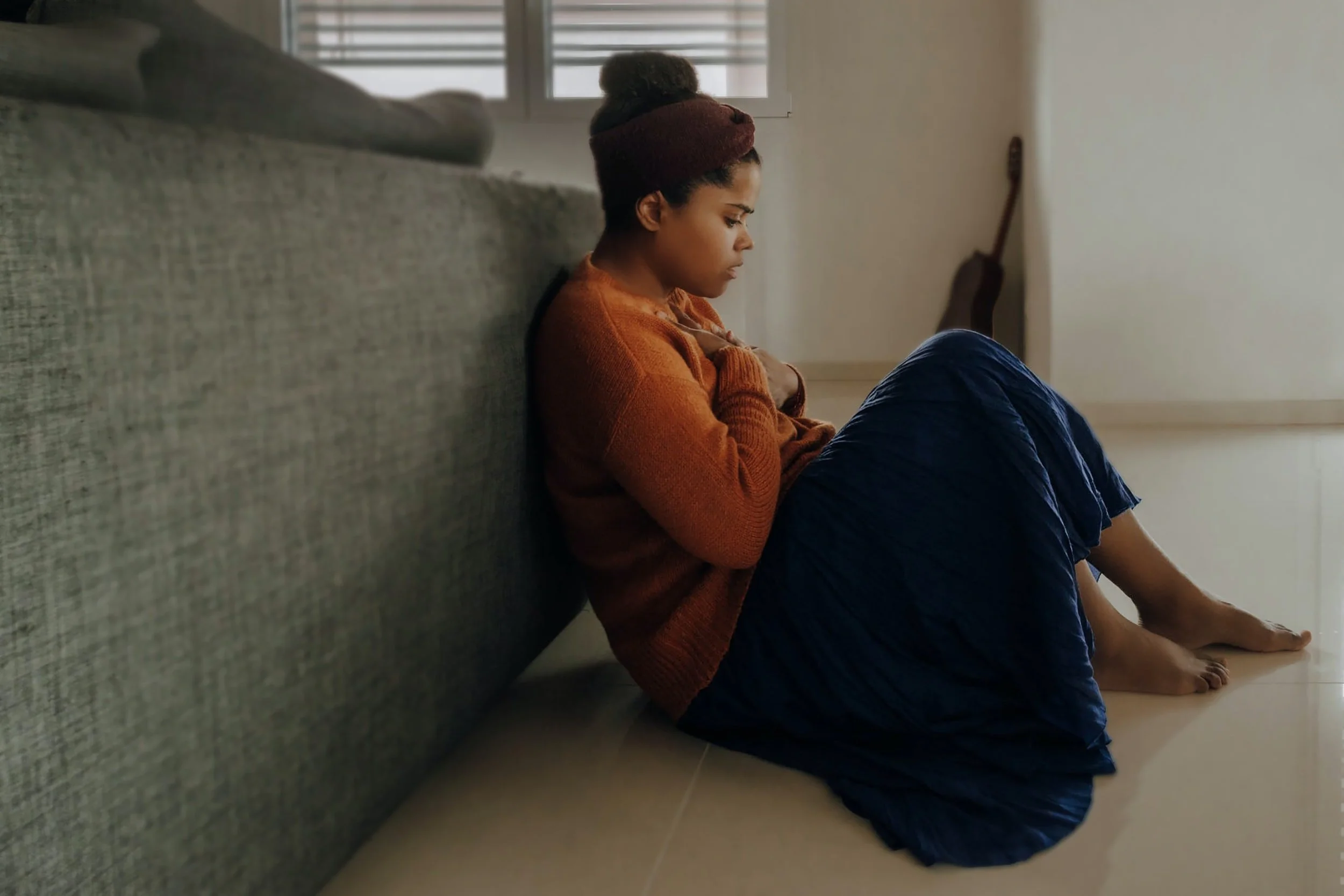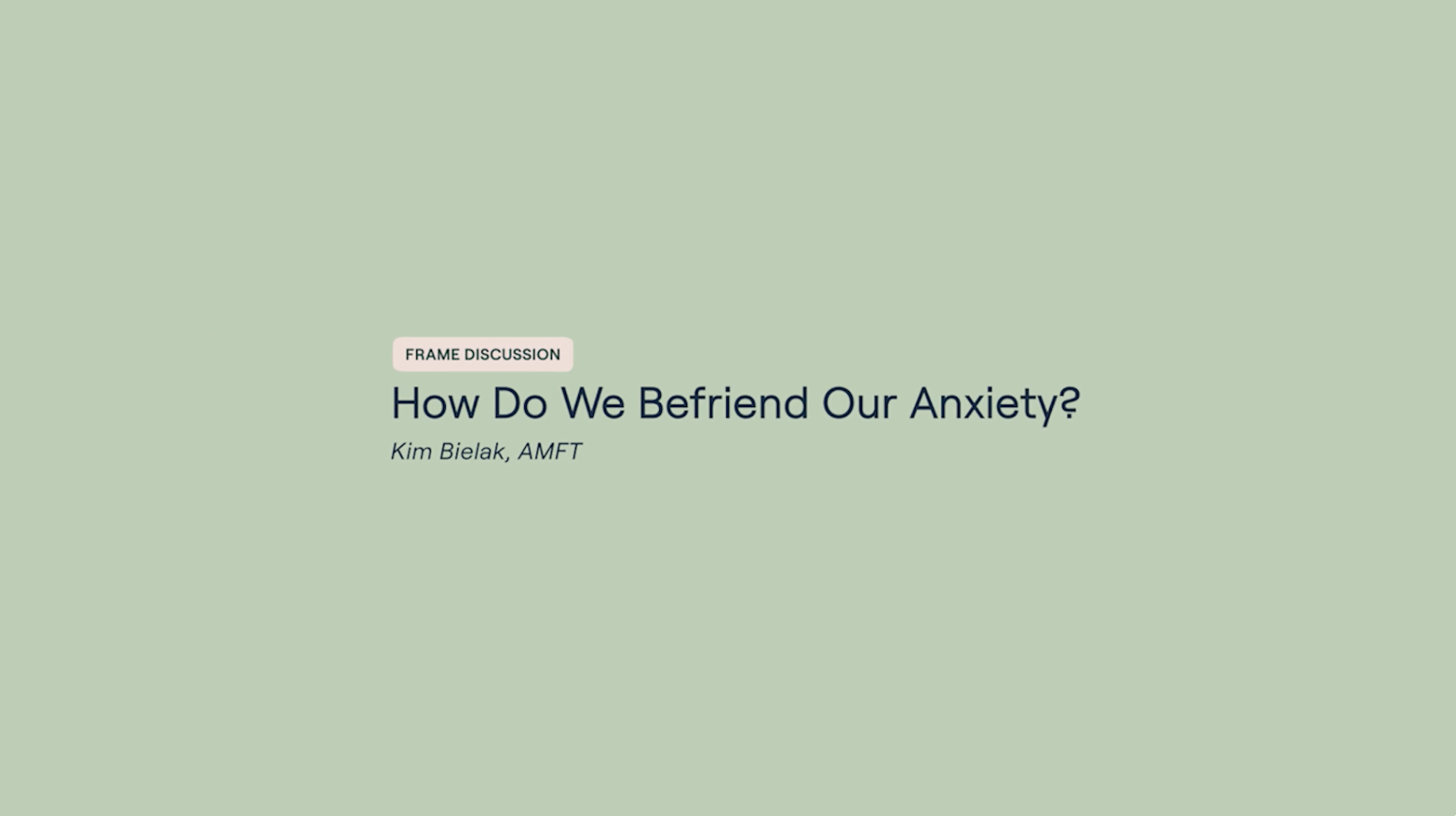This month I worked with therapy content platform, Frame, to create a short video on making friends with your anxiety. Watch the full video here, or read a write-up below!
Clients often come to me looking for a way to “get rid of” their anxiety. Even if most people know it’s not realistic to think they’ll do away with it forever, their underlying intention is to “fix” their anxiety, “overcome” their anxiety, and get themselves to a place where they won’t have to “deal” with anxiety anymore.
The truth is, you’re never going to just “get rid of” anxiety. It’s kind of like saying you can just get rid of sadness. Sadness will come and go many times in your life, and quite frankly I don’t think we’d want a life completely without it. The problem lies when things like sadness or anxiety become extreme - they start to have a negative impact on our relationships, our work, or even our ability to feel good about ourselves. When that’s the case, there’s a lot we can do through therapy to influence the degree, intensity, or impact of anxiety so that it’s not running our lives, but fighting it usually isn’t what’s going to do the trick. As Carl Jung once said: “What we resist not only persists, but will grow in size.”
So the first thing I encourage clients to acknowledge is that anxiety is something that is always going to be a part of them. When it shows up, we can start to see it as an “old friend” who is back again, rather than beat ourselves up not having gotten “past it” yet.
What’s the purpose of anxiety?
Believe it or not, anxiety was designed to keep us safe. Like fear, it serves the evolutionarily adaptive function of detecting and alerting us to threats. However, also like fear, anxiety can sometimes get it wrong - especially because it’s focused on unknown or anticipated threats sometime in the future.
That said, when anxiety shows up, one of the key things to remember is it’s trying to protect us. If we consider this before we simply write these feelings off, we just might find that there’s important information here. What might your anxiety be trying to protect you from? Maybe you’re worried about being loved, or about your financial security. Whether the threat is realistic or not, it’s important to acknowledge that these are real human needs that deserve attention - especially if they’re feeling a little vulnerable.
Getting rid of your anxiety the minute it shows up cuts off your ability to dive more deeply into what’s actually making you anxious in the first place and address the issue at the root cause.
Instead, if we acknowledge the adaptive function of anxiety to protect us and keep us safe, we just might start to find it - dare I say - useful in some cases!
What are some ways to work with anxiety, rather than against it?
Once we stop fighting our anxiety, we can start to create a very different relationship with it. A few of my favorite ways of working with anxiety I like to use with my clients:
1. Slow down and get curious about your anxiety.
As most of us are probably familiar with, anxiety often happens when we’re going too fast. It also gives us tunnel vision. But when we slow down and approach our anxiety with curiosity and open-mindedness, we are already naturally starting to shift into a state and mindset that is more open, flexible, and grounded. From here it’s much easier to stop an anxiety spiral in its tracks and prevent further escalation of your symptoms.
2. Notice your anxiety in the body.
Becoming curious and naming the sensations you feel not only naturally gets your “out of your head,” but it also helps us increase our familiarity with our anxiety. The more we strengthen this relationship, the more we can begin to notice the small cues that anxiety has started to show up while it’s still manageable, rather than once it’s escalated to the point of a full breakdown or panic attack.
3. Ask: What is my anxiety trying to tell me?
Once again, you can actually use the opportunity when anxiety shows up as a way to gather information. What is it your anxiety is trying to get you to pay attention to? A fun and slightly more creative way to do this is to actually have a dialogue with your anxiety. Write it out, or speak back and forth with it to try to understand where it’s coming from. When we approach things like anxiety with empathy and create the space to truly listen, you’ll often find it needs to speak a lot less loudly to get heard.
Ultimately once we create a better relationship with our anxiety, we can actually begin to use it as a helpful indicator. It’s almost like the tightness in your chest, pit in your stomach, or tension in your neck is just your body’s way of trying to get your attention - like a warning light on your dash. What an amazing tool if we simply choose to use it as such!
So next time your anxiety shows up, perhaps you go as far as to thank it - Thank you for getting my attention that something’s not quite right. Now, what is it you need me to look into?
Interested in therapy? Set up a free consultation call here.






